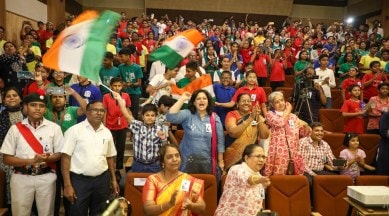Click here to join Express Pune WhatsApp channel and get a curated list of our stories
Chandrayan-3 moon landing: Cheer, applause and pride galore as students, teachers, scientists watch it live at IUCAA
The silence in the hall during the spacecraft landing, which was live streamed at Chandrasekhar Auditorium, was broken by applause only during progression of Chandrayaan-3 into each of the four stages of landing, and when the Prime Minister's live broadcast from Johannesburg replaced visuals from ISRO.

In a hall resounding with cheers and applause, students, astronomers, teachers and young children witnessed the successful soft landing of Chandrayaan-3 on the moon on Wednesday evening at the Inter-University Centre for Astronomy and Astrophysics (IUCAA).
The silence in the hall during the spacecraft landing, which was live streamed at Chandrasekhar Auditorium, was broken by applause only during progression of Chandrayaan-3 into each of the four stages of landing, and when the Prime Minister’s live broadcast from Johannesburg replaced visuals from ISRO.
monthly limit of free stories.
with an Express account.
As Chandrayaan-3 began its vertical descent, exhilaration reached a tipping point. People jumped out of their seats, hands in air, clapping, hooting and chanting ‘Vande Mataram’ and ‘Bharat Mata ki Jai’ with excitement that is otherwise usually reserved for cricket matches or Salman Khan films. The words of S Somnath, Chairperson of ISRO, drowned in the endless cheer, and it was only when PM Narendra Modi began speaking, that the hall was appeased into whispers.
“It is so inspiring to me that India is now the fourth country to land on the moon, and the first on its south pole,” said the excited Mehak Pandita, a master’s student specialising in Astrophysics. “There were several obstacles but we overcame them and made our Chanda-mama dream come true!”
Director of IUCAA, Professor R Srianand, said, “This is a historical achievement and a great moment for the country’s scientific community. It is a huge encouragement to students especially because it was developed after failure. It also raises hopes for the solar mission that IUCAA will be directly involved in.”
The auditorium had begun filling up much earlier in anticipation of a lecture by former Deputy Director of Vikram Sarabhai Space Centre, MC Uttam, right before the landing live stream.
He traced ISRO’s journey right from its modest launch from Thumba in 1963 of a sounding rocket purchased from the USA, to India’s own path-breaking lunar missions.
The excitement was palpable as a string of questions from students and the public about the lunar mission followed the lecture by the astronomer, who is also honorary director of ISRO Space Technology Cell at Savitribai Phule Pune University. The reasons for the failure of Chandrayaan-2 and the changes made in Chandrayaan-3 were of most interest to people at the event organised by SciPop, the public outreach society of IUCAA.
MC Uttam was surrounded by students for a long time afterwards, and it was only the beginning of the live stream from ISRO that the interaction came to a halt.
Click here to join Express Pune WhatsApp channel and get a curated list of our stories